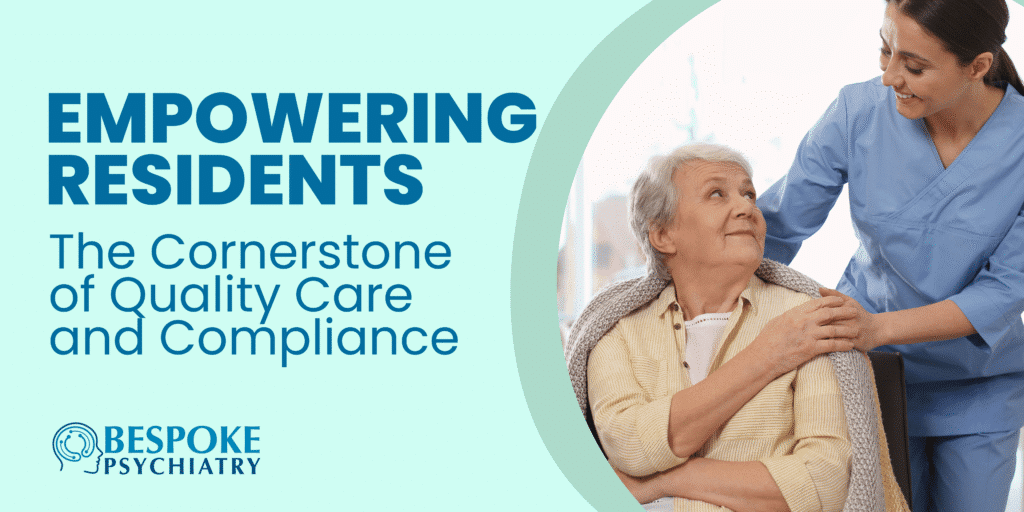
Bespoke Psychiatry CEO and Board Certified Psychiatrist
As nursing home administrators and staff, you play a vital role in the lives of your residents, ensuring their well-being and maintaining a supportive environment. The landscape of long-term care in Illinois is continuously evolving, and recent updates to regulations from CMS are underscoring a critical aspect of quality care: engaging residents in their own care.
These regulations emphasize that residents are not merely recipients of care, but active partners in their health journey. This shift aligns with a broader philosophy of person-centered care, recognizing each individual’s autonomy, preferences, and right to make informed decisions about their lives and treatment.
Practical Ways to Engage Residents in Their Care:
- Active Participation in Care Planning: The care plan should be a collaborative document, not just a clinical record. Involve residents (and their POA/Guardian) in discussions about their health goals, preferences for daily routines, activity choices, and treatment options. Document their input clearly within the care plan. Quoting the resident is a great way to do that.
- Meaningful Choices: Whenever possible, offer choices in daily life. This can be as simple as choosing mealtimes, what clothes to wear, when to wake up or go to bed, or which activities to participate in. Even small choices can significantly impact a resident’s sense of control and dignity.
- Respecting Preferences and Values: Incorporate residents’ cultural, spiritual, and personal values into their care. For example, if a resident has a preference for certain foods, religious observances, or social interactions, strive to accommodate these.
The Critical Importance of Consent, Especially for Psychotropic Medications
Survey teams may hone in on the need for informed consent for psychotropic medications. These medications, which affect brain activity and behavior, carry significant implications and potential side effects. Therefore, it is imperative that residents, or their legally authorized representatives (Power of Attorney or Guardian), fully understand the purpose, potential benefits, risks, and alternatives before consenting to their use. And that should be documented!
At a minimum, for every psychotropic medication, you must have a clear, documented consent on file from the resident, POA, or guardian. This demonstrates that the resident (or their representative) has been engaged in this crucial aspect of their care and that their autonomy and choice have been respected.
Recommended Audit Practice: Ensuring Compliance and Resident Well-being
To ensure ongoing compliance and uphold the highest standards of resident-centered care, we strongly recommend that facilities periodically run an audit of their psychotropic medication records. This audit should verify that:
- Every psychotropic medication currently prescribed has a corresponding, properly documented consent form on file.
- The consent form is recent and reflects the current medication and dosage.
- The consent clearly indicates that the resident, POA, or guardian was informed of the medication’s purpose, potential side effects, benefits, and any non-pharmacological alternatives.
This proactive approach not only helps your facility meet CMS regulatory requirements but also reinforces your commitment to ethical practice and the well-being of your residents. By empowering residents to be active participants in their care, we cultivate an environment where dignity, respect, and informed choice are paramount.
If you are interested in learning more about how Bespoke Psychiatry can assist your long-term care community, or would like additional information, please contact Meghan Wilinski, Manager of Business Development at 773-416-3656 or meghan.wilinski@bespokepsychiatry.com.



